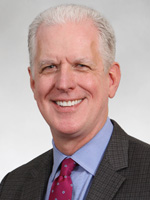Permanente physician leader selected for deploying advanced precision-medicine pathways, 24/7 virtual urgent care, and AI-powered scribe technology.
Colin Cave, MD, on treating climate change as a public health crisis

Review California AB-1305 compliance disclosures on our greenhouse gas emissions reduction efforts.
In a recent video interview with the American Medical Association, Permanente physician leader Colin Cave, MD, stressed the need to treat climate change as a public health crisis and discussed how vulnerable communities are disproportionately impacted by rising temperatures and what steps physicians and health systems can take to mitigate the harmful effects of global warming.
The link between extreme temperatures and severe weather-related environmental catastrophes is undeniable. But the record-breaking heat is also putting public health at risk in other ways. “When we look at the disease burden that is carried, the effects of climate change increase illnesses like myocardial infarction, strokes, and asthma,” he told the AMA News. Every time there is a fire in the Pacific Northwest, Dr. Cave said, Northwest Permanente sees a 5 to 25% increase in emergency room visits and hospitalizations.
As Northwest Permanente’s director of External Affairs, Government Relations, and Community Health, Dr. Cave is a vocal advocate speaking out in defense of at-risk populations. He noted that those living in “heat sinks” – areas that have little to no trees and large amounts of concrete – face the greatest health impacts. “It’s important that we focus on how climate change disproportionately affects certain communities, and those communities are typically communities of color,” said Dr. Cave.
Related story: “Podcast: Addressing climate change’s impacts on health – Permanente Medicine”
Despite the growing crisis, Dr. Cave said there are actions physicians and health systems can take to lower the effects of climate change. Increasing virtual visits, for example, can dramatically decrease greenhouse gas emissions compared to in-person visits. A study published in The Journal of Climate Change and Health co-written by Dr. Cave found that telehealth visits could cut the carbon footprint from patient travel in half. “It basically eliminated 9,000 metric tons of CO2 from being put out into the air in the Pacific Northwest,” he said.
Reducing emissions at the health system level is also important, Dr. Cave said. Kaiser Permanente was the first U.S. health care organization to achieve certified carbon neutral status. Kaiser Permanente has also committed to reducing its greenhouse gas emissions by 50% by 2030, with the goal of achieving net-zero emissions by 2050.
Still, Dr. Cave said more needs to be done. “As hopeful as we are, and as much as we really want global warming to decrease, we’re also realists. We … understand that we need to be prepared to work and meet our mission of improving the health of our members and our communities in a climate-changed world.”
To read the entire article and watch the interview, visit the American Medical Association’s website.


